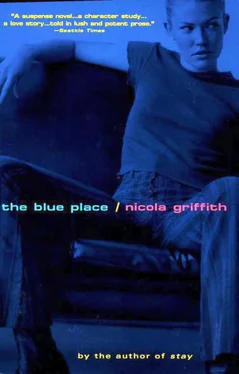I mulled it over. I had spent more time as a member of the Red Dogs, the hit squad of the APD, than I had as a regular detective, but the basics were very simple: gather information, assimilate the evidence, make an arrest—or, in this case, give everything to the police so they could make the arrest. But information was the first step.
Although I had Charlie Sweeting’s phone number, I looked him up in the book. He was listed under Charlie Sweeting , not C . or Charles , and the number matched the one Julia had given me. One face for all comers. I phoned. He agreed, in the kind of Southern accent that seems to embarrass the inhabitants of the New Atlanta, to see me just as soon as I could get there.
He lived ten minutes from me, on Spring Street, where the servants’ cottages in the back gardens were bigger than my house. I pulled up before a mansion with a sweeping front lawn that was probably planted sixty years ago, bright with thousands, perhaps tens of thousands, of perfect tulips. They would not last much longer in this heat, no matter how many gardeners he employed. One of them was out there now in threadbare summer chinos, clipping busily.
He stood up as I approached the door and I realized immediately that he was not the gardener. “Miss Torvingen?”
White moustache beautifully trimmed, greyish blue eyes, thin, freckled arms with crepey skin, liver spots showing through the thinning yellow-white hair. Old enough to be stubborn about the ways to address women. “Yes.”
He stripped off his work gloves and held out a long, beautifully kept hand that looked absurdly young and able. “How do you do?”
“A little warm.” I wasn’t, particularly, but I am tall and move too easily, and old-fashioned Southern men never relax around me until they can convince themselves that they are physically superior. It speeds things along a little if I help them out. He led me into the airy entrance hall and then a sunny drawing room. Air-conditioning whispered in the background. He spent some time pulling out the chair, ordering me iced tea from his housekeeper, asking me if the temperature was agreeable.
“Lovely tea,” I said when it arrived, and it was: brown and strong as a tennis player’s arm, and cool, with just the right touch of lemon.
“Thank you. Bessie’s been making it for the family to that same secret recipe for twenty years.”
I smiled, and we complacently admired our exchange of information: I had the breeding and manners to not rush, to appreciate his hospitality; he was rich and settled enough to have an old family retainer and to putter about in his own garden if he chose.
“Now then, Miss Torvingen—”
“Aud, please.”
“Then you must call me Charlie. Miss Lyons-Bennet tells me there’s been some unpleasant business with the painting I sold to Honeycutt. Something about a fire, and now questions about the insurance.”
“Yes.”
“And you think I can help?”
“I do. I’d be grateful if you could tell me first why you decided to sell.”
He looked at the European cut of my clothes. “I don’t know how long you’ve lived in Atlanta, Aud, but it’s a thrusting, hot-blooded place. Fortunes to be made, even now.” He knew as well as I did that Atlanta fortunes were now made by real estate reptiles with cold eyes and flickering, forked tongues. “I’m a hot-blooded man myself, and that Friedrich was a cold piece of work to wake up to, day after day, every brushstroke just so, making the ice look like a bunch of stacked bricks. I just got tired of the darn thing.”
“You didn’t start to wonder whether or not it was authentic?”
His face stilled for a moment, then stretched in a grin that was wide enough to draw what was left of his widow’s peak an inch closer to his eyebrows. “So that’s what this is about! No wonder Julia was so goddamned coy on the phone. Looks like I got rid of it in the nick of time. They think my Friedrich’s a fake?”
“Actually, it depends on who you mean by ‘they.’”
“Oh, let’s quit fencing, shall we?” He was full of good humour now: he hadn’t been skunked in any deal. He was still a top dog. “So what you want to know is: was I a dupe, or was I trying to dupe someone else?”
“That’s about the size of it.”
“All I can tell you is that I bought a painting from Julia Lyons-Bennet in good faith, and sold that exact same painting in just as good faith three months ago. I believed—still do, as a matter of fact—that it was genuine. No one but a poker-faced German with a high pucker factor could have painted such a humourless thing. No, no,” he said genially, “the only thing I can’t tell you is why I bought it in the first place.”
I switched direction. “How did you come to offer the painting to Honeycutt?”
“ He made an offer to me .”
“How did that come about?”
“We were at one of those damn charity dinners, for the zoo, I think, or maybe it was the symphony. Anyhow, he was asking about reputable dealers in the city. I told him about Julia—how she got me a good price on the Friedrich even though I now hated the damn thing. Then a few months later we bumped into each other in Turner’s box at a Braves game.” He was much too well bred to wait to see if I had picked up on the fact that he had been Ted Turner’s guest, but I obliged him with raised eyebrows anyway. “He’d remembered our conversation. We talked some more about other things, investments and so on. It’s always good to know another banker, so I invited him to the party I give every year to pay off all my social obligations—kills about a hundred birds with one stone. Anyhow, he accepted. During that party—and I remember particularly because we were just about to start serving the food, and goose goes cold so fast—he asked to see the painting. It used to hang in the upstairs dressing room, so I told him to take a look but not to be too long if he wanted any of the bird. When he came down, he said he’d like to buy it. I told him he could have it and welcome if he paid what I paid for it two years ago, plus ten percent—art goes up all the time, you know, even stiff Germanic mistakes like that—plus any expenses. And that was pretty much that.”
“When was your party?”
“January nineteenth.”
“And the Braves game?”
“That would have been September or thereabouts.”
“Tell me what you think of Honeycutt.”
His eyes gleamed with amusement. “He speaks well and knows the right people but I wouldn’t put my money in his bank, and I sure as hell wouldn’t trust him to be able to shoot his own dog if he had to.”
I considered for a moment. Good old Charlie Sweeting liked me, probably thought I was a smart, sweet thing. “I’d like to ask you a favour.”
“Fire away.”
“I’d like to meet Mr. Honeycutt, but I don’t want him to know why I want to meet him. It’s all very delicate, with Ms. Lyons-Bennet’s reputation involved and so on. Perhaps you could think of a way?”
“Well, now, I might just at that. Give me a day to chew on it.”
I gave him my card and left him feeling quite pleased with himself.
When I built the deck and the master suite, I turned one of the original two bedrooms into my work space. It is a big, square room, with a heart-of-pine floor, large windows and a skylight. Up against the two white walls farthest from the door are my benches and vises, the mitre, jig, and radial arm saws, the sanders, well machined, efficient and reasonably new. I use them when needed and forget about them when not. The wall on the right as I enter the room is where I keep my hand tools, some of which I have had since I was a teenager. I found my brad-awl, for example, in a junk shop in a small Yorkshire town; it was probably made in the 1920s; its smooth wooden handle nests perfectly in my palm. I have several planes, different sizes and types. Their handles are painted sober, strong colours—navy blue, hunter green, chocolate—their blades all gleam that particular oily grey of quality steel. The chisels, with their matching pale oak handles, are a complete set that belonged to one of my mother’s uncles. I know the foibles of every single tool, how each shapes the wood to which I set it.
Читать дальше












